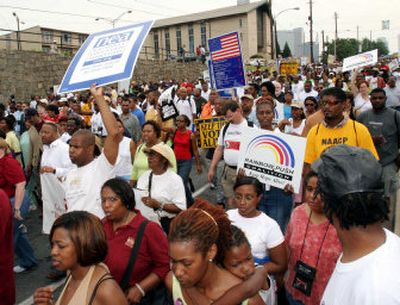Voting rights still drawing challenges

WASHINGTON – Saturday marked the 40th year of the Voting Rights Act, and civil rights activists poured into sticky-hot Atlanta for a march that harks back to the thunderous demonstrations and rallies that led to the act’s signing on Aug. 6, 1965.
Black, Hispanic and Asian American leaders are fighting a law passed by the state’s Republican-controlled legislature in March that requires voters to obtain one of six forms of photo identification before going to the polls, as opposed to the 17 types of picture and non-picture ID they currently use. Georgia officials say the changes – which experts say will make the state’s screening measures the strictest in the nation – are needed to prevent fraud.
The skirmish over the Georgia rules is a part of the continuing debate over the landmark voting rights legislation, which has boosted minority representation and altered the contours of American politics. At the time the law was enacted, there were three black members of Congress; today there are 43. There are also 25 Hispanic House members and one Hispanic senator, compared with five members of Congress in 1965.
“It’s important to use the anniversary to really emphasize to folks the importance of what this act means and what it stood for,” said Henry Flores, a professor of political science at St. Mary’s University in San Antonio.
Awareness of the legislation was raised with the release of memos written by Supreme Court nominee John G. Roberts Jr. from his days as a young aide in Ronald Reagan’s Justice Department. Those memos revealed that Roberts forcefully advocated a policy that would shorten the law’s reach. The policy sought to bar only voting rules that discriminated intentionally, as opposed to barring rules that have a discriminatory effect.
As Congress deliberates reauthorizing the act, which is set to expire at the end of next year, some conservative critics argue that two key provisions should be modified, if not dropped altogether. One of those provisions, Section 5, requires states to draw minority-controlled congressional districts if black and Hispanic voters dominate certain residential areas.
Section 5 also required election officials in nine states, mostly in the South, to submit any voting rules changes that might affect minorities to the Justice Department for pre-clearance.